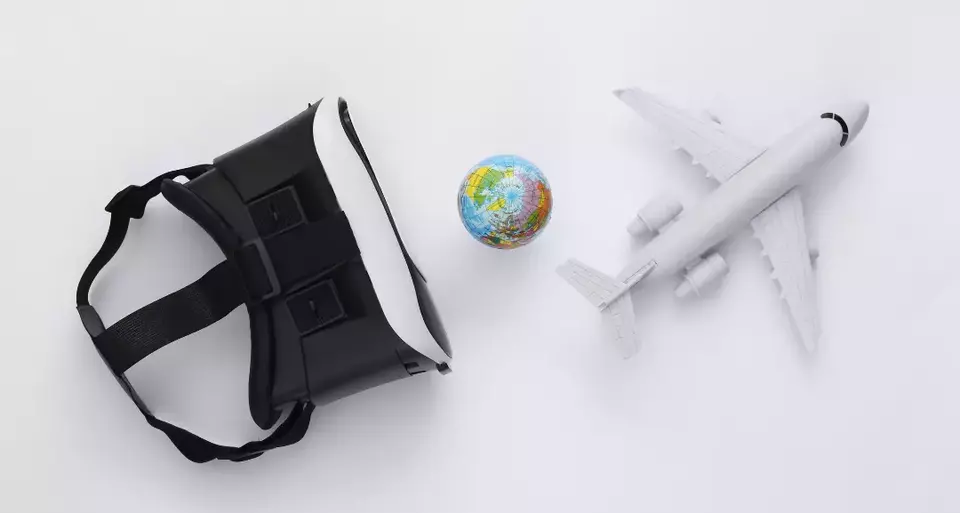Virtual Travel: Exploring the World with Virtual Reality and Metaverse Experiences
Posted on July 30, 2023 5 minutes 995 words
Table of contents
In the digital age, the concept of travel has been revolutionized. Virtual Reality (VR) and the emerging Metaverse are reshaping the way we explore the world, especially in the realm of business travel. This shift towards virtual travel offers numerous benefits, including cost savings, convenience, and the ability to traverse geographical boundaries without leaving the comfort of our homes or offices. As we delve deeper into this evolving realm, we also witness exciting possibilities for personal travel experiences and opportunities for learning and growth.
The Rise of Virtual Travel
Virtual travel is not a new concept, but recent advancements in technology have made it more accessible and immersive than ever before. The COVID-19 pandemic has further accelerated this trend, with travel restrictions prompting businesses and individuals to seek alternative ways to connect and explore. The change in lifestyle and work patterns has also facilitated a newfound acceptance of virtual realities, as they provide a safe and convenient alternative to in-person interactions.
Virtual travel allows us to visit far-off places, historical landmarks, or even outer space, all from the safety and comfort of our own homes. It has also opened up possibilities for virtual education, allowing students to take virtual field trips to places they would otherwise not have the opportunity to visit. For businesses, this means the ability to conduct meetings, conferences, and product demonstrations in a virtual environment, saving both time and resources.
VR and Metaverse in Business Travel
The use of VR and the Metaverse in business travel is expanding rapidly. Businesses can create virtual meeting spaces that mimic the physical world, or even go beyond it, creating environments that would be impossible in reality. This not only provides a unique and immersive experience but also allows for greater flexibility and creativity in presentations and collaborations.
In addition to these applications, businesses are finding innovative ways to use these technologies for team building and employee training. VR can simulate various scenarios, making it an effective tool for learning and development. On the other hand, the Metaverse offers opportunities for employees located in different parts of the world to connect and interact in ways that were previously unimaginable.
Virtual Tours of Accommodation and Meeting Spaces
One of the most practical applications of VR in business travel is the ability to view hotel rooms, meeting spaces, or event venues before booking. This allows businesses to ensure that the chosen location meets their needs and expectations, reducing the risk of unpleasant surprises upon arrival. Moreover, this technology can also be used to give potential customers a virtual tour of a company’s offices or facilities, enhancing transparency and building trust.
Booking.com, a leading digital travel platform, discusses this trend in their blog post, “The Future of Business Travel”. They highlight how businesses can use VR to explore potential accommodations and meeting spaces, ensuring they meet their specific needs. As technology improves, we may also see virtual tours becoming a standard feature of online booking platforms, enhancing the customer experience and decision-making process.
The Future of Virtual Travel
As we gaze into the future of virtual travel, the prospects seem promising and filled with unlimited possibilities. We can anticipate further technological enhancements leading to more realistic, immersive, and multi-sensory experiences. VR is poised to become even more sophisticated, with advances such as haptic feedback making it possible to ‘feel’ virtual objects or environments. This could dramatically amplify the user experience, adding layers of authenticity and depth to our virtual explorations.
In the realm of the Metaverse, a future development could be the seamless integration of AI-powered virtual guides. These guides could offer personalized tours, adapt to individual preferences, and provide context and information in real time. Imagine a virtual safari where an AI guide points out animals and shares fascinating insights about their behavior, or a historical tour where you can witness significant events and interact with AI-powered historical figures.
Additionally, the potential for social interactions in the Metaverse is enormous. We could see a future where virtual travelers can meet and interact with other travelers from different parts of the world, sharing experiences, learning about different cultures, and forming connections. These social Metaverse spaces might become new tourist destinations, offering unique cultural, educational, and recreational experiences.
Another exciting prospect is the concept of time travel. With VR, it could be possible to visit different historical eras, explore ancient civilizations, or even glimpse into the future. This could revolutionize education and make learning history an immersive, interactive experience.
In terms of business travel, we may see a shift towards a hybrid model that combines the best of physical and virtual travel. For example, a business could host a hybrid conference where some attendees are present in person while others join virtually, interacting through their avatars. This would allow businesses to reach a wider audience and offer a more flexible and inclusive approach.
As the technologies advance and become more mainstream, the distinction between physical and virtual travel is likely to blur. This might fundamentally alter our perception of travel and open up new possibilities for exploration, learning, and connection.
Challenges and Considerations
Despite its many benefits, virtual travel also presents some challenges. High-quality VR equipment can be expensive, and not everyone has access to it. There are also potential issues with motion sickness for some users. Furthermore, while virtual experiences can mimic many aspects of physical presence, they still can’t fully replicate the nuances of face-to-face interactions.
Conclusion
The world of travel is evolving, and businesses need to stay ahead of the curve. VR and the Metaverse offer exciting possibilities for business travel, from virtual meetings to virtual tours of potential accommodations. As these technologies continue to improve, they are set to play an increasingly important role in how we conduct business and explore the world.
And if you’re curious to learn more about the future of business travel, check out this insightful blog post** by Booking.com.








